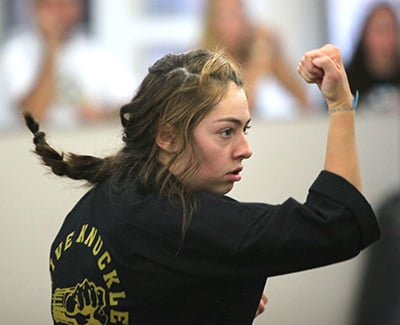Karate and nursing school may not seem to have much in common. However, both pursuits require consistent effort, a willingness to practice (and study), master skills, continuous learning, and a significant commitment of time, energy, and resources.
Having earned her black belt in karate, and soon to receive her bachelor of science in nursing (BSN) degree from the University of Colorado College of Nursing at Anschutz Medical Campus, Madisen O’Laughlin knows about the intersection of martial arts and healthcare firsthand.
“In terms of nursing and life, mastering karate made me more willing to accept challenges and put myself out there.”– CU Nursing BSN student Madisen O’Laughlin

Madisen O'Laughlin during her Black Belt test |
While O’Laughlin and her sister were encouraged by their father to take karate classes in childhood, both stuck with the discipline and earned their black belts as young adults.
“It was very mentally challenging and very nerve-wracking,” O’Laughlin says of the rigorous, two-day test she endured to earn her black belt. “They don’t tell you what to expect, and then you end up sparring with a bunch of people, and you’re just exhausted.”
Ultimately, O’Laughlin says that karate boosted her confidence level and shaped her into the person she is today.
“In terms of nursing and life, mastering karate made me more willing to accept challenges and put myself out there,” she says.
Life experiences inspired career
Growing up with her family in Arvada, O’Laughlin says she was intrigued by nursing at a fairly young age.
“When I was in fifth grade, my grandfather started having a lot of health problems,” she says. “For about four years, we were constantly in rehabilitation centers, nursing homes and hospitals. So I spent a lot of time surrounded by nurses, and I really felt appreciative toward them. When nurses would care for my grandpa, it would make me feel less anxious. I wanted to do the same thing for someone else. I wanted to give back to the nurses for helping my grandpa.”
While still in high school, O’Laughlin earned her certified nursing assistant (CNA) certificate and began working at the same assisted living facility where her grandfather received care.
“It was kind of cool because that was only about two years after he passed, and I was able to go back and be a part of the team,” she says. “It was very emotional, but I knew the layout, and I was much more comfortable than I would have been starting somewhere else.”
Following her nursing path, O’Laughlin enrolled in CU College of Nursing’s BSN program on the traditional pathway. Upon acceptance into the honors program, she intended to research dementia and Alzheimer’s but gravitated toward researching military and veterans’ health. During her mental health rotation, she did clinical work at a specialized military unit at Denver Springs Psychiatric Hospital. She says she has a newfound passion for the population.
“Normally, as a nurse, you are focused on vitals, diet, and what kind of medicine they need, but in the psych department, I was able to offer more in the way of non-medical help, such as talking to them, comforting them, and hearing their stories,” she says. “I really liked that. So often, society sort of stigmatizes these people, but I was kind of taken aback by how open they are. It made my job a lot easier because they were welcoming me into their lives to help them.”
Overall, O’Laughlin says she enjoyed her experience at CU Nursing – from working with her cohort to simulations with “robotic patients.” For her research work, she surveyed student-veterans at the four CU campuses and queried them about their education/vocation, finances, health, and social relationships to inform what resources they might need to be successful throughout their academic experience. O’laughlin intends to publish these results, following graduation.
Future aspirations, moving forward
After she earns her BSN, O’Laughlin says she’s setting her sights on continuing in one of the nurse practitioner programs at CU Nursing.
“I still have a lot of motivation to further my education,” she says. “Right now, I don’t have a family or kids of my own, so I’m in a good space to continue. I know that I will come back sooner rather than later.”



